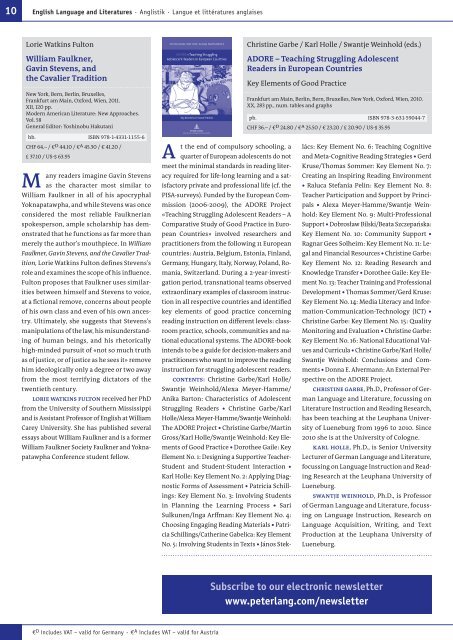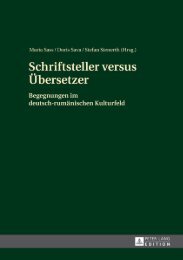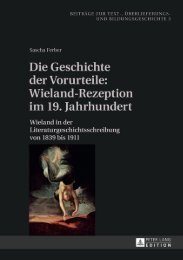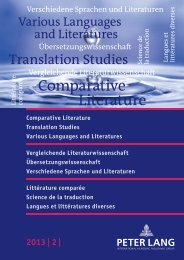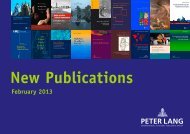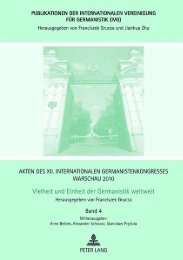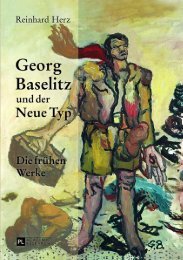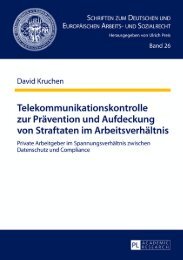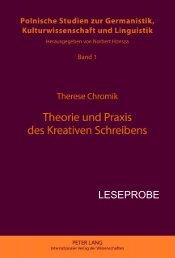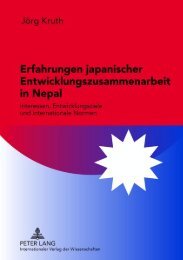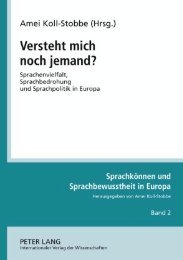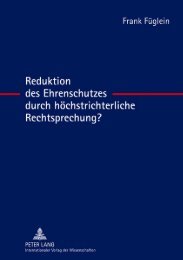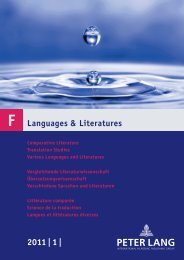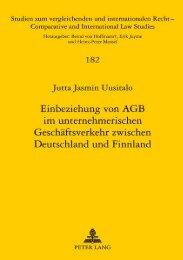Languages & Literatures 2011 | 1 | - Peter Lang
Languages & Literatures 2011 | 1 | - Peter Lang
Languages & Literatures 2011 | 1 | - Peter Lang
You also want an ePaper? Increase the reach of your titles
YUMPU automatically turns print PDFs into web optimized ePapers that Google loves.
10 English <strong>Lang</strong>uage and <strong>Literatures</strong> · Anglistik · <strong>Lang</strong>ue et littératures anglaises<br />
Lorie Watkins Fulton<br />
William Faulkner,<br />
Gavin Stevens, and<br />
the Cavalier Tradition<br />
New York, Bern, Berlin, Bruxelles,<br />
Frankfurt am Main, Oxford, Wien, <strong>2011</strong> .<br />
XII, 120 pp .<br />
Modern American Literature: New Approaches .<br />
Vol . 58<br />
General Editor: Yoshinobu Hakutani<br />
hb . ISBN 978-1-4331-1155-6<br />
CHF 64 .– / € D 44 .10 / € A 45 .30 / € 41 .20 /<br />
£ 37 .10 / US-$ 63 .95<br />
M<br />
any readers imagine Gavin Stevens<br />
as the character most similar to<br />
William Faulkner in all of his apocryphal<br />
Yoknapatawpha, and while Stevens was once<br />
considered the most reliable Faulknerian<br />
spokesperson, ample scholarship has demonstrated<br />
that he functions as far more than<br />
merely the author’s mouthpiece . In William<br />
Faulkner, Gavin Stevens, and the Cavalier Tradition,<br />
Lorie Watkins Fulton defines Stevens’s<br />
role and examines the scope of his influence .<br />
Fulton proposes that Faulkner uses similarities<br />
between himself and Stevens to voice,<br />
at a fictional remove, concerns about people<br />
of his own class and even of his own ancestry<br />
. Ultimately, she suggests that Stevens’s<br />
manipulations of the law, his misunderstanding<br />
of human beings, and his rhetorically<br />
high-minded pursuit of «not so much truth<br />
as of justice, or of justice as he sees it» remove<br />
him ideologically only a degree or two away<br />
from the most terrifying dictators of the<br />
twentieth century .<br />
loRie watKinS Fulton received her PhD<br />
from the University of Southern Mississippi<br />
and is Assistant Professor of English at William<br />
Carey University . She has published several<br />
essays about William Faulkner and is a former<br />
William Faulkner Society Faulkner and Yoknapatawpha<br />
Conference student fellow .<br />
A<br />
€ D includes VAT – valid for Germany · € A includes VAT – valid for Austria<br />
t the end of compulsory schooling, a<br />
quarter of European adolescents do not<br />
meet the minimal standards in reading literacy<br />
required for life-long learning and a satisfactory<br />
private and professional life (cf . the<br />
PISA-surveys) . Funded by the European Commission<br />
(2006-2009), the ADORE Project<br />
«Teaching Struggling Adolescent Readers – A<br />
Comparative Study of Good Practice in European<br />
Countries» involved researchers and<br />
practitioners from the following 11 European<br />
countries: Austria, Belgium, Estonia, Finland,<br />
Germany, Hungary, Italy, Norway, Poland, Romania,<br />
Switzerland . During a 2-year-investigation<br />
period, transnational teams observed<br />
extraordinary examples of classroom instruction<br />
in all respective countries and identified<br />
key elements of good practice concerning<br />
reading instruction on different levels: classroom<br />
practice, schools, communities and national<br />
educational systems . The ADORE-book<br />
intends to be a guide for decision-makers and<br />
practitioners who want to improve the reading<br />
instruction for struggling adolescent readers .<br />
ContentS: Christine Garbe/Karl Holle/<br />
Swantje Weinhold/Alexa Meyer-Hamme/<br />
Anika Barton: Characteristics of Adolescent<br />
Struggling Readers • Christine Garbe/Karl<br />
Holle/Alexa Meyer-Hamme/Swantje Weinhold:<br />
The ADORE Project • Christine Garbe/Martin<br />
Gross/Karl Holle/Swantje Weinhold: Key Elements<br />
of Good Practice • Dorothee Gaile: Key<br />
Element No . 1: Designing a Supportive Teacher-<br />
Student and Student-Student Interaction •<br />
Karl Holle: Key Element No . 2: Applying Diagnostic<br />
Forms of Assessment • Patricia Schillings:<br />
Key Element No . 3: Involving Students<br />
in Planning the Learning Process • Sari<br />
Sulkunen/Inga Arffman: Key Element No . 4:<br />
Choosing Engaging Reading Materials • Patricia<br />
Schillings/Catherine Gabelica: Key Element<br />
No . 5: Involving Students in Texts • János Stek-<br />
Christine Garbe / Karl Holle / Swantje Weinhold (eds .)<br />
ADORE – Teaching Struggling Adolescent<br />
Readers in European Countries<br />
Key Elements of Good Practice<br />
Frankfurt am Main, Berlin, Bern, Bruxelles, New York, Oxford, Wien, 2010 .<br />
XX, 283 pp ., num . tables and graphs<br />
pb . ISBN 978-3-631-59044-7<br />
CHF 36 .– / € D 24 .80 / € A 25 .50 / € 23 .20 / £ 20 .90 / US-$ 35 .95<br />
lács: Key Element No . 6: Teaching Cognitive<br />
and Meta-Cognitive Reading Strategies • Gerd<br />
Kruse/Thomas Sommer: Key Element No . 7:<br />
Creating an Inspiring Reading Environment<br />
• Raluca Stefania Pelin: Key Element No . 8:<br />
Teacher Participation and Support by Principals<br />
• Alexa Meyer-Hamme/Swantje Weinhold:<br />
Key Element No . 9: Multi-Professional<br />
Support • Dobrosław Bilski/Beata Szczepańska:<br />
Key Element No . 10: Community Support •<br />
Ragnar Gees Solheim: Key Element No . 11: Legal<br />
and Financial Resources • Christine Garbe:<br />
Key Element No . 12: Reading Research and<br />
Knowledge Transfer • Dorothee Gaile: Key Element<br />
No . 13: Teacher Training and Professional<br />
Development • Thomas Sommer/Gerd Kruse:<br />
Key Element No . 14: Media Literacy and Information-Communication-Technology<br />
(ICT) •<br />
Christine Garbe: Key Element No . 15: Quality<br />
Monitoring and Evaluation • Christine Garbe:<br />
Key Element No . 16: National Educational Values<br />
and Curricula • Christine Garbe/Karl Holle/<br />
Swantje Weinhold: Conclusions and Comments<br />
• Donna E . Alvermann: An External Perspective<br />
on the ADORE Project .<br />
ChRiStine gaRBe , Ph .D ., Professor of German<br />
<strong>Lang</strong>uage and Literature, focussing on<br />
Literature Instruction and Reading Research,<br />
has been teaching at the Leuphana University<br />
of Lueneburg from 1996 to 2010 . Since<br />
2010 she is at the University of Cologne .<br />
KaRl holle , Ph .D ., is Senior University<br />
Lecturer of German <strong>Lang</strong>uage and Literature,<br />
focussing on <strong>Lang</strong>uage Instruction and Reading<br />
Research at the Leuphana University of<br />
Lueneburg .<br />
SwantJe weinhold , Ph .D ., is Professor<br />
of German <strong>Lang</strong>uage and Literature, focussing<br />
on <strong>Lang</strong>uage Instruction, Research on<br />
<strong>Lang</strong>uage Acquisition, Writing, and Text<br />
Production at the Leuphana University of<br />
Lueneburg .<br />
Subscribe to our electronic newsletter<br />
www.peterlang.com/newsletter


